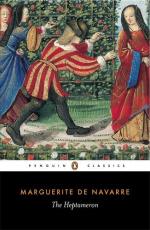January 1893.
ON THE HEPTAMERON,
WITH SOME NOTICE OF PRECEDENT COLLECTIONS OF TALES IN FRANCE, OF THE AUTHOR, AND OF HER OTHER WORKS.
It is probable that every one who has had much to do with the study of literature has conceived certain preferences for books which he knows not to belong absolutely to the first order, but which he thinks to have been unjustly depreciated by the general judgment, and which appeal to his own tastes or sympathies with particular strength. One of such books in my own case is THE HEPTAMERON of Margaret of Navarre. I have read it again and again, sometimes at short intervals, sometimes at longer, during the lapse of some five-and-twenty years since I first met with it. But the place which it holds in my critical judgment and in my private affections has hardly altered at all since the first reading. I like it as a reader perhaps rather more than I esteem it as a critic; but even as a critic, and allowing fully for the personal equation, I think that it deserves a far higher place than is generally accorded to it.
Three mistakes, as it seems to me, pervade most of the estimates, critical or uncritical, of the Heptameron, the two first of old date, the third of recent origin. The first is that it is a comparatively feeble imitation of a great original, and that any one who knows Boccaccio need hardly trouble himself to know Margaret of Navarre. The second is that it is a loose if not obscene book, disgraceful for a lady to have written (or at least mothered), and not very creditable for any one to read. The third is that it is interesting as the gossip of a certain class of modern newspapers is interesting, because it tells scandal about distinguished personages, and has for its interlocutors other distinguished personages, who can be identified without much difficulty, and the identification of whom adds zest to the reading. All these three seem to me to be mistakes of fact and of judgment. In the first place, the Heptameron borrows from its original literally nothing but plan. Its stories are quite independent; the similarity of name is only a bookseller’s invention, though a rather happy one; and the personal setting, which is in Boccaccio a mere framework, has here considerable substance and interest. In the second place, the accusation of looseness is wildly exaggerated. There is one very coarse but not in the least immoral story in the Heptameron; there are several broad jests on the obnoxious cloister and its vices, there are many tales which are not intended virginibus puerisque, and there is a pervading flavour of that half-French, half-Italian courtship of married women which was at the time usual everywhere out of England. The manners are not our manners, and what may be called the moral tone is distinguished by a singular cast, of which more presently. But if not entirely a book for boys and girls, the Heptameron




